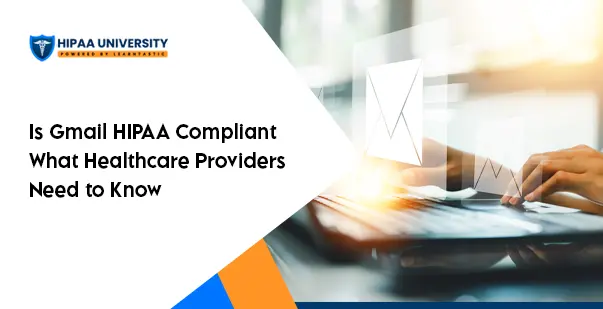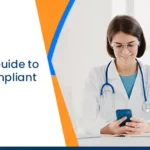Is Gmail HIPAA Compliant: What Healthcare Providers Need to Know

September 3, 2024
Table of Contents:
- Introduction
- Understanding HIPAA Compliance
- Is Gmail HIPAA Compliant 2024?
- Common Pitfalls and How to Avoid Them
- Alternatives to Gmail for HIPAA-Compliant Communication
- Be Cautious with Sensitive Patient Information
Introduction
Healthcare professionals commonly use Gmail to communicate and exchange important information. But, is Gmail HIPAA Compliant? Can your patient’s data be breached and stolen from Gmail? According to a study by the University of Michigan, 25% of healthcare data breaches involve email. That’s why your email provider should follow HIPAA standards to protect patient information.
Gmail is widely used, but can it meet the strict requirements of HIPAA? While many healthcare providers use Gmail, without the proper safeguards, it might not fully protect sensitive data. This might lead to data breaches, violations, and fines.
In this guide, you’ll find out if Gmail is in compliance with HIPAA or not, it’s security features, and things you need to avoid to sidestep the violations.
Understanding HIPAA Compliance
Understanding HIPAA compliance is crucial if you work in healthcare. HIPAA, or the Health Insurance Portability and Accountability Act, sets rules to protect patient information. These rules ensure that sensitive data remains secure when you handle it.
Here’s what you need to know:
- Protecting Patient Information: HIPAA aims to keep patient data, known as Protected Health Information (PHI), secure. PHI includes anything that can identify a patient, such as names, addresses, phone numbers, and medical records. This data must be protected at all times, whether it’s on paper, stored electronically, or shared through communication.
- Key Requirements:
- Privacy Rule: This rule focuses on maintaining the confidentiality of patient information. PHI can only be shared under specific circumstances, such as for treatment, payment, or healthcare operations. In all other cases, the patient’s permission is required.
- Security Rule: This rule protects PHI that’s stored or sent electronically. You must use safeguards like encryption and access controls to keep this data secure. The rule ensures that only authorized individuals can access sensitive information.
- Breach Notification Rule: If there’s a data breach, you need to notify the affected patients, the Department of Health and Human Services (HHS), and sometimes even the media. This must be done quickly to limit the damage.
- Business Associate Agreements (BAAs): If you work with a third party that handles PHI on your behalf, you need a Business Associate Agreement (BAA). This agreement ensures that the third party also follows HIPAA rules. Without a BAA, you risk a breach, which can lead to hefty fines and damage to your reputation.
Read more: What Is The Purpose of HIPAA in 2024?
Is Gmail HIPAA Compliant 2024?
When you’re considering Gmail for your healthcare communication, it’s essential to know if it meets HIPAA standards. Let’s break it down to help you understand whether Gmail is HIPAA compliant and what steps you can take.
Gmail’s Security Features
Gmail includes several security features that might seem to meet the requirements for HIPAA compliance:
- Encryption:Gmail uses TLS (Transport Layer Security) to encrypt emails. This means your emails are protected from being read by unauthorized individuals during transmission.
- Two-Step Verification: You can add an extra layer of security by enabling two-step verification. This helps prevent unauthorized access to your account.
But here’s the catch—just having these security features isn’t enough to make Gmail HIPAA compliant on its own.
Business Associate Agreement (BAA) with Google
For Gmail to be HIPAA compliant, you must have a Business Associate Agreement (BAA) with Google. This agreement ensures that Google will protect any Protected Health Information (PHI) that passes through Gmail. Without a BAA, using Gmail for PHI could result in a violation of HIPAA rules.
A BAA is like a promise from Google that they’ll handle your data with the care required under HIPAA. Without it, you can’t be sure that your emails are fully protected.
Google Workspace for Healthcare
Gmail on its own (the free version) does not offer a BAA. You need to upgrade to Google Workspace, which includes Gmail along with other tools like Google Drive and Calendar. Google Workspace is designed with more security features and is the only way Google offers a BAA.
- Upgrade for Compliance: If you want to use Gmail in a HIPAA-compliant manner, upgrading to Google Workspace is essential. This step gives you access to the BAA and enhanced security.
Using Gmail Correctly for HIPAA Compliance
Even with Google Workspace and a BAA, you must use Gmail correctly to stay HIPAA compliant. Here’s what you should do:
- Encrypt Emails: Always ensure that emails containing PHI are encrypted. While Gmail encrypts emails in transit, you should verify that encryption is enabled for all messages.
- Limit Access: Only authorized users should have access to your Gmail account. Set up strong passwords and use two-step verification to further secure your account.
- Avoid Sending PHI via Regular Gmail: If you haven’t signed a BAA or are using a free Gmail account, avoid sending any emails that contain PHI.
Common Pitfalls and How to Avoid Them
When you’re dealing with patient information, staying HIPAA compliant is essential. However, it’s easy to make mistakes with email, especially when using Gmail. So, is Gmail HIPAA compliant? Here are some common pitfalls and how you can avoid them:
-
Using Personal Gmail Accounts
It might seem convenient to use your personal Gmail account for work, but doing so can put patient information at risk. Personal accounts don’t have the same security features as Google Workspace accounts, which are designed for business use. This means your emails might not be secure enough to meet HIPAA standards.
Avoid This Pitfall:
- Always use a Google Workspace account for work-related emails.
- Ensure your account is set up with the necessary security features, like encryption.
- Never mix personal and professional emails. Keep them separate to ensure security.
-
Ignoring Encryption
Encryption is key to protecting sensitive information. If you send emails without encryption, anyone who intercepts them could access the patient data inside. This could lead to a HIPAA violation, which could be costly and damage your reputation.
Avoid This Pitfall:
- Use encryption for all emails containing Protected Health Information (PHI).
- Ensure that your Google Workspace account has encryption enabled.
- Double-check that your emails are encrypted before sending them. It’s a simple step that can make a big difference.
-
Failure to Sign a Business Associate Agreement (BAA)
A BAA is a contract between you and Google that ensures both parties understand how to protect patient information. Without a BAA, Google is not legally bound to keep your data secure, leaving you vulnerable to HIPAA violations.
Avoid This Pitfall:
- Sign a BAA with Google as soon as you set up your Google Workspace account.
- Keep a copy of the BAA for your records as proof that you’re doing everything you can to stay compliant.
- Regularly review the BAA to ensure it’s still valid and up-to-date.
-
Forgetting to Train Your Staff
Your staff plays a crucial role in keeping patient information safe. If they’re not properly trained, they might accidentally send sensitive data in an unsecured email or use a personal account by mistake.
Avoid This Pitfall:
- Provide regular training on HIPAA compliance and secure email practices.
- Encourage your team to ask questions if they’re unsure about something.
- Make it easy for them to follow the rules by setting up clear guidelines and providing the right tools.
-
Not Monitoring Email Activity
Even if you’ve set up everything perfectly, you can’t just “set it and forget it.” Monitoring your email activity is crucial to ensure ongoing compliance. If something goes wrong, you need to catch it quickly to avoid bigger issues.
Avoid This Pitfall:
- Use tools that monitor and log email activity to help spot any unusual behavior.
- Regularly audit your email system to ensure everything is working as it should.
- Stay proactive. Address any issues as soon as they arise to keep your communications secure.
-
Sending Emails Without Double-Checking Recipients
It’s easy to type in the wrong email address by mistake, but if that email contains patient information, it could lead to a breach of privacy. This is one of the simplest mistakes to make, but also one of the easiest to avoid.
Avoid This Pitfall:
- Always double-check the recipient’s email address before hitting “send.”
- Use auto-complete with caution. While helpful, it can lead to mistakes if you’re not careful.
- Consider adding a second layer of verification for emails containing sensitive information.
Staying HIPAA compliant with Gmail isn’t difficult, but it does require attention to detail. By avoiding these common pitfalls, you’ll protect your patients’ information and keep your practice safe.
If you’re wondering, “How do I know if my Gmail is HIPAA compliant?”—the key is to stay proactive and ensure every email you send meets the standards. Learn more about HIPAA in an online HIPAA Certification course and know everything a healthcare professional or business person should know.
Alternatives to Gmail for HIPAA-Compliant Communication
If you’re wondering whether Gmail is HIPAA compliant, you might also be curious about other options. While Gmail can work with the right setup, other email services are specifically built for HIPAA compliance. These can be easier and more secure for your needs.
- ProtonMail: This service offers end-to-end encryption by default. It also provides a Business Associate Agreement (BAA), which is essential for HIPAA compliance.
- Hushmail: Hushmail includes built-in encryption and secure forms for patient communication. It’s designed with healthcare providers in mind.
- Paubox: Paubox offers a seamless experience with no need for additional steps like portals or plugins. Emails are encrypted automatically.
Choosing an alternative ensures extra peace of mind. These services take care of the tricky parts, so you can focus on what you do best—caring for patients. Remember, it’s always important to verify whether Gmail is HIPAA compliant for your specific needs before making a decision.
Read more: How to Make Your Email HIPAA Compliant
Be Cautious with Sensitive Patient Information
We have the answer to the question, “Is Gmail HIPAA compliant?”. But, double-checking everything to make sure your email communication is HIPAA compliant is crucial for protecting patient information.
By choosing the right email service and setting up proper safeguards, you can confidently manage sensitive data. Remember, it’s always better to be safe than sorry. Take the time to review your email practices and make any necessary changes.
When you prioritize compliance, you protect your patients and your practice. Keep your communication secure and your focus on delivering the best care.





